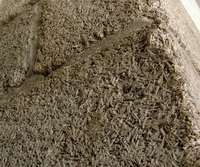In Cape Town, 1,800 women ran trying to save their homes from a runaway fire, a shortage of water and planning led to 1 death and 4 serious burns.
Saturday, December 03, 2005
High participation rate of women is grassroots Habitat Jamm'in
The Huairou Commission has brought over 4,000 grassroots women, from more than 25 countries into Habitat JAM activities. Many of our organizations held meetings prior to JAM, and they chose delegates to represent them at the JAM. Some examples: • In Montevideo, Uruguay, Cotidiano Mujer brought together 30 women from a marginalized urban neighborhoods to meet and sit together at the computers, all on Habitat JAM. The women were assisted by a facilitator and translator/typists. • In Russia, Information Center of the Independent Women's Forum (ICIWF) pulled together 17 community groups who want to share their successes in learning how to run a civil society by partnering with local government. • In India, Swayam Shikshan Prayog (SSP) put together an Information Fair and other actitivies—attracting over 3,000 women from disaster plagued states, and women working with local government, and on water and sanitation—to gather their ideas for the JAM. See postings by Smita Sawant for updates! • In Cameroon, 380 women of the Ntankah Village Women Common Initiative Group have collected their thoughts on urban development. These were then delivered to the JAM by a select group of leaders whohave now had their first international experience. They rented an entire Internet cafe and filled it with their women! • In Canada, Women in Cities International, translated and circulated all Habitat JAM materials to thousands of women from French speaking women's groups networks. • In Peru, 50 women met to hold a local peer exchange, sharing their practices: community banks, ecological parks, earthquake resistant housing construction. Then, a smaller group of women went to an Internet cafe, in their slum neighborhood, and have been participatin gin JAM, to bring in the results of their meeting.
Subscribe to:
Post Comments (Atom)






No comments:
Post a Comment